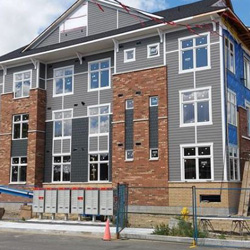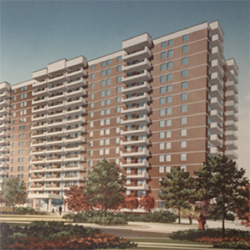Legal
The Smoke-Free Ontario Act, 2017, prohibits smoking of tobacco, the use of electronic cigarettes to vape any substance, and the smoking of cannabis (both medical or recreational) in common areas of public places. This includes common indoor areas of condominiums, apartments, and buildings including the corridors, elevators, and laundry rooms.
Municipal governments have the authority to ban or restrict smoking and vaping in public places within their geographic limits and to create smoking by-laws that exceed Ontario’s smoke-free legislation. Contact your local municipality to find out if any such by-laws apply to your building.
Yes. It is perfectly legal for a housing co-operative to have a no-smoking bylaw, provided that it is confirmed by at least a two-thirds vote of the co-operative’s members. Co-op boards can protect the health and safety of their members and protect their property as long as it does not conflict with federal or provincial law.
Resources:
Enforcement Officers from local public health units will carry out inspections and investigate complaints in common areas of apartments, condominiums, and college and university campuses in order to enforce the Smoke-Free Ontario Act, 2017. Call your local public health unit to report a violation of the Smoke-Free Ontario Act.
Under the Smoke-Free Ontario Act, 2017, co-op boards have a responsibility to:
- Ensure that everyone is aware that smoking is prohibited in common areas;
- Remove ashtrays and any object that serves as one;
- Ensure that no one smokes in the common areas of these residences;
- Post “no-smoking and no-vaping” signs at all entrances, exits, washrooms, and other appropriate locations.
- Download How to implement a no-smoking policy for a multi-unit dwelling: A protocol for condominiums and housing co-operatives;
- Consider adopting a no-smoking policy;
- Investigate where the smoke is coming from, and how it is entering the unit;
- Seal and caulk cracks and gaps to mitigate the smoke. This will work best if you seal both units: where it is coming from and where it is going;
- Service the ventilation system and ensure the system is functioning properly;
- Talk to members who smoke. Explore the option of smoking outdoors, or in one particular room with the window open, etc. Members might not be aware that smoke bothers other tenants in the building.
Indigenous people have been using traditional or sacred tobacco for thousands of years. Traditional or sacred tobacco differs from commercial tobacco in that it is used in a variety of ways including ceremonial or sacred rituals for healing and purifying and in social customs where it is given or exchanged as a sign of respect. Traditional or sacred tobacco is grown and dried without additives.
The ceremonial use of tobacco is not exempt from smoke-free policies in multi-unit housing unless explicitly stated. However, under human rights legislation all Ontarians are under a duty to accommodate the religious beliefs and practices of others. The duty to accommodate goes both ways, as such any resident(s) using tobacco for ceremonial purposes should ensure they are not causing other residents undue harm. Tips for supporting ceremonial use of tobacco include:
- Engaging the tenant(s) to understand their ceremonial use of tobacco.
- Learning the duration and frequency of intended ceremonial tobacco use.
- Finding ways to accommodate ceremonial tobacco use that does not expose other tenants to second hand smoke exposure. For example, if possible, recommend outdoor use and remove any barriers that might inhibit the ceremony from taking place outdoors.
If the ceremonial use of tobacco is to be used indoors, establish a communication system to inform other residents about the ceremonial use of tobacco in order to avoid complaints and bridge any religious or cultural misunderstandings.
This issue has been considered numerous times throughout the years, and Canadian courts have consistently ruled – with one exception – that addiction to nicotine is not a disability.
In a residential situation, even if people who smoke were found to be a protected group on the basis of their addiction, they would be under a duty to co-operate with alternative solutions for their addiction that do not expose neighbours and bystanders to harmful second-hand smoke. This could include smoking outside or obtaining nicotine through alternative means that do not emit second-hand smoke, such as nicotine gum, nicotine lozenges or nicotine inhalers.
There is no legal precedent to repeal a smoke-free policy to accommodate a resident with a nicotine addiction. Just because someone exercises their freedom to smoke does not mean they have an absolute right to smoke regardless of others in the building.
A disability designation is very individual. If an adjudicator were to rule that a smoking tenant was disabled, it does not mean that all tenants who smoke, or all tenants in Ontario, would also be recognized as disabled.
Resources:
Accommodations for medical cannabis must be made on a case-by-case basis. Accommodations are fact specific and need to address the disability-related needs of the person being accommodated. Accommodations could include:
- Smoking outside
- Using forms of cannabis aside from smoking such as vaping products, tincture, pills, or edibles
- Moving to a unit where outside access is easier.
To justify smoking a number of things would normally need to be established including:
- Smoking is the prescribed method the patient is to consume cannabis to achieve the desired therapeutic effect for the treatment of a disability or disability related symptoms – medical evidence can be requested.
- Smoking outside is too much of a hardship (e.g., the person is not ambulatory).
If the above is established, the Housing Provider would need to consider accommodation measures to the point of undue hardship. A housing provider must provide an accommodation, but this does not necessarily mean the person has the right to smoke in their unit. Also, it is important to remember that challenges may arise regardless of whether they have any basis. To avoid litigation, some housing providers may simply allow smoking of cannabis if medical status can be demonstrated.
Termination of membership is one penalty that could be applied to individuals who persistently smoke or permit smoking where it has been prohibited. Review the by-laws of your housing cooperative for procedures.
Health
There is no safe level of exposure to second-hand smoke. Second-hand smoke has more than 50 cancer-causing chemicals and has been identified as a toxic air contaminate and known carcinogen.
People who breathe second-hand smoke are at increased risk for:
- heart disease
- lung cancer
- emphysema
- acute respiratory problems (like asthma)
- chest infections
- excessive coughing
- throat irritation
Unborn babies are at a higher risk for:
- low birth weight
Babies and children are at a higher risk for:
- Sudden Infant Death Syndrome (SIDS)
- asthma
- pneumonia
- bronchitis
- croup and coughs
- ear infections
- While they can help, air filters, purifiers, and ventilation systems cannot eliminate second-hand smoke. Some of the smoke and larger particles from the air may be removed, but they will not remove the smaller particles or gases found in second-hand smoke.
- Read what Health Canada has to say about second-hand smoke and air filters, purifiers and ventilation. For more information about ventilation and second-hand smoke visit the Centers for Disease Control.
Other
The smoke-free housing directory can help you find smoke-free housing. It lists private, non-profits, condominiums, cooperatives, and rentals that have either gone smoke-free or are in the process of doing so and it is being continuously updated.






